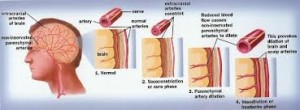 The brain is a sensitive organ that picks up many messages from the body. We have to be bit of a detective when working out what may be causing our headache or migraine. A headache can be seen as a message, but what is our body trying to tell us? When trying to unpick why they are happening it helps to keep a diary of occurrences for a few months to see if a pattern evolves.
The brain is a sensitive organ that picks up many messages from the body. We have to be bit of a detective when working out what may be causing our headache or migraine. A headache can be seen as a message, but what is our body trying to tell us? When trying to unpick why they are happening it helps to keep a diary of occurrences for a few months to see if a pattern evolves.
Some people find their problems may be linked to menstruation. Some people get headaches first thing in the morning or mostly at the weekends. Maybe a particular food is involved or perhaps some of the messages the brain is being bombarded with come from toxins from the gut, stress, eyesight problems, or perhaps you are a persons who generally gets a lot of cramps. Once your pattern has been established then you can start to solve the cause of your head pain.
Headaches
If you suffer from cephalalgia, the technical name for headaches, you are not alone. More than 10 million people in the UK commonly get headaches and there are considered two main types. Primary occur for their own reasons, while secondary as the name suggests are secondary to some other problem or health consideration.
Contributing factors to suffering a headache
- Bowel – constipation. Inadequate intake of fibre and water and imbalanced bowel flora can lead to poor waste excretion i.e. constipation or IBS. This can cause a toxic overload of chemicals to affect the brain amongst other organs.
- The Liver is our bodies filter. It removes both internal toxins, such as
 from the above overwhelmed bowel, or external toxins such as alcohol. Your liver filters over 1200 pints of blood a day. If we overload our liver then we can not expect it to work as efficiently. Headaches over the eyes are often an indicator of gallbladder or liver problems as this is where the gall bladder meridian runs. A meridian is how acupuncturists describe the individual energy pathways that run throughout the body. They believe it is the blockages in these pathways that cause illness.
from the above overwhelmed bowel, or external toxins such as alcohol. Your liver filters over 1200 pints of blood a day. If we overload our liver then we can not expect it to work as efficiently. Headaches over the eyes are often an indicator of gallbladder or liver problems as this is where the gall bladder meridian runs. A meridian is how acupuncturists describe the individual energy pathways that run throughout the body. They believe it is the blockages in these pathways that cause illness. - Caffeine addiction – is your headache telling us you are ready for your next fix. If you do not think you have a physical addiction to coffee but regularly drink three or four cups a day then stop completely tomorrow and lets see what your body tells you.
- Structural problems such as poor eyesight or a back or neck problem. Regular eyesight and osteopathic assessments can help to narrow your search for the cause of your problem.
- Dehydration. Next time you get a headache try a glass of
 water before you reach for a pain killer. Early morning headaches are often caused by dehydration as are exercise induced headaches or any situation that may induce sweating.
water before you reach for a pain killer. Early morning headaches are often caused by dehydration as are exercise induced headaches or any situation that may induce sweating. - Tension headaches. These can be the effect of physical tension held in the neck, head and particularly face. The pain tends to be felt as a steady constant or dull pain that starts at the base of the skull or in the forehead and spreads over the entire head giving the sensation of physical pressure or tightening around the head.
- A particular type of tension pain is classed as temporomandibular joint dysfunction (TMJ). It is often found in people who grind or clench their teeth at night and also accounts for many early morning headaches. If you also suffer from other types of muscular stress and cramping it may be useful to consider whether you have enough of the muscle relaxing minerals such as magnesium.
Migraine
One in 10 people are thought to be susceptible to migraine in a ratio of three to one women to men. The average first experience is 38 years old and they are rarely first experienced over 50.
Whether Classic (with aura) or Common (without) migraines can be a very disruptive and unpleasant factor in your life. Although the word migraine derives from the Greek word for pain on one side of the head –hemikrania- pain is usually felt bilaterally or on both sides of the head during a migraine.
Classic migraines typically cause about 30 minutes of vasoconstriction –  narrowing of the blood vessels- in the brain. This is what can cause the strange sensory effects known as the aura. This is usually followed by vasodilatation – which is where the blood vessels dilate and throb with every beat of the heart, hence the pounding headache.
narrowing of the blood vessels- in the brain. This is what can cause the strange sensory effects known as the aura. This is usually followed by vasodilatation – which is where the blood vessels dilate and throb with every beat of the heart, hence the pounding headache.
In common migraine there is no vasoconstriction – the constriction of the blood vessels in the brain – that cause the aura.
Although I use the word ‘typically’ it is commonly acknowledged that symptoms of migraine can vary enormously from person to person. Often only the presence of certain structural defects separate these experiences from certain forms of epilepsy such as temporal lobe epilepsy.
Contributing factors to suffering a Migraine
Certain Foods can be common offenders i.e. Cured meats, chocolate, cheese, caffeine, citrus fruits, alcohol, liver. pickled herring. These foods are among those that contain amines. These are natural substances that exert a direct effect on blood vessels in those sensitive to their effects. It may be that a person is lacking an enzyme which would normally deal with such an active ingredient.
Some people may just be intolerant to certain food types. Keeping a strict food diary should help to pinpoint such triggers.
Hormones. Some women have migraines at random time throughout their monthly reproductive cycle, but always have a major migraine on or before their period commences. Some only have their migraine pre-menstrually.
It is now fairly well established that mot of these pre-menstrual symptoms are linked with a rapidly declining level of progesterone which occurs just before menstruation.
Light. Glaring light or flashing lights such as travelling in a car past trees  where the sun-light is flashing through, can all provoke migraine in susceptible people. It is advisable not to work on computers in front of windows facing into the sun for similar reasons.
where the sun-light is flashing through, can all provoke migraine in susceptible people. It is advisable not to work on computers in front of windows facing into the sun for similar reasons.
Emotional changes such as anger and even the let-down period after stress are known to be triggers. The latter accounts for why many people experience a migraine when they go on holiday or at the start of the weekend. There are many ways to manage your stress but one that definitely helps is managing your blood sugar.
If we get hungry then we release stress hormones that in turn help to release sugar into the body. This is typical example of the body trying to be helpful in the short term but the long term effect is we get flooded with stress hormones when there is no physical stress we need to react to.
Dietary measures to balance blood sugar such as eating small meals of carbohydrate and protein every 2-3 hours and making sure we can adequately use the sugars in our system by having adequate levels of minerals such as chromium will help to balance our blood sugar and therefore our stress hormones. Living on coffee and sugary snacks to keep us going when we feel we are about to fall over will not.
Genetics. Although we are hearing more frequently that people may be genetically predisposed to some family health issue and migraine is one of these, I do not believe this should stop each individual from sieving through the evidence to remove as many of the above environmental factors as possible. If you feel overwhelmed then seek the guidance of a well trained nutritional therapist who will be able to guide you through the process.
